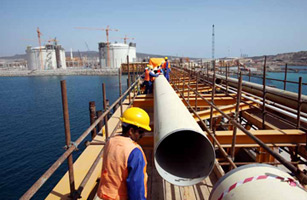
Open pipeline Total's new terminal in Balhaf, Yemen, began exporting gas in November
It is past midnight in a jet high above the Persian Gulf, and one of the key figures in global energy shows no sign of retiring. Instead, Christophe de Margerie, CEO of the French oil giant Total, zeroes in on a favorite target: criticisms of oil companies by environmental groups, gathered in Copenhagen for the U.N. Climate Summit. "People say they are inventing electric cars," de Margerie says, puffing on a Marlboro. "Well, where is the electricity coming from? Flowers? Maybe someday. But what is available now is oil and gas."
The argument is delivered in de Margerie's trademark style: blunt and impassioned, with an almost cocky certitude. He credits his confidence to years spent traveling — "moving my ass," as he calls it — and witnessing the world up close. All that time on the road has convinced him of this: oil supplies will soon run seriously short, and until we come up with something better we need to make sure we suck every last drop from every last nook and cranny on the planet. "We don't know everything," he says. "But on oil reserves and production we know a lot. And it's our duty to speak out."
It helps that the person doing the talking heads one of the biggest energy firms on the planet. A decade after it bought its French competitor Elf Aquitaine, Total has ballooned into the world's sixth largest publicly traded energy company, according to Energy Intelligence Research. By market capitalization, the company is worth around $150 billion and returned profits in 2008 of $21 billion. From its skyscraper headquarters on the edge of Paris, de Margerie oversees operations and 97,000 staff in more than 130 countries. But as the company has grown, so too have doubts about how Total, and other oil giants, will survive the coming decades. As oil becomes increasingly difficult to find and extract, and as governments embrace cleaner sources of energy, won't those most invested in finite resources become irrelevant?
De Margerie doesn't think so. The 58- year-old took over at Total in 2007, just as anxieties about global warming took off. With his rumpled look and a moustache resembling two squirrels' tails, he looks more like a college professor than CEO of one of the biggest companies in the world. An avid conversationalist, he is soft-spoken, with old-world ways: he kisses my hand when saying goodbye, and prods a Camembert cheese over dinner before tut-tutting "Pas bon." Samuel Ciszuk, an energy expert at the consultancy IHS Global Insight, describes him as "a mix between the French aristocrat and the wildcatter."
De Margerie claims he has always been shy and has learned to "listen to people, from the hotel doorman to the King of Saudi Arabia." He might as easily have joined the many de Margeries in the French diplomatic corps. Instead, he stumbled into the oil industry by accident, when, at 22, he took a summer internship at Total because its headquarters was an easy walk from his home in western Paris. It was 1974, the middle of the Middle East oil crisis. "People said: 'Are you crazy? This company will go bankrupt in six months,'" he recalls. But the political turmoil around oil intrigued him. "It's the most fascinating industry in the world," he says.
De Margerie is renowned for running late for meetings. Jacques de Boisseson, Total representative in China, says he was on tenterhooks during de Margerie's visit to Beijing last year, when the Total chief kept Chinese energy executives waiting while he chatted to a hotel porter. Indeed, says de Boisseson, his boss's ability to "get very close to very different people" is a valuable icebreaker when negotiating. During talks with Qatar officials over a contract in 1998, with the soccer World Cup under way in France, "Christophe began talking about the World Cup," de Boisseson says. "It was just the kind of thing we needed to warm up the atmosphere. He changes a meeting with his personal touch." At a security summit in Bahrain last December, a former British diplomat said he was amazed when de Margerie handed him his business card. "I couldn't believe that this ordinary-looking bloke I was chatting to was the head of Total," he says.
Ordinary does not mean humdrum. In an industry famous for being opaque, de Margerie speaks openly about the nightmare scenario — oil shortages — that most energy firms prefer to avoid or deny. De Margerie says the possible effects on the world economy of dwindling oil supplies are so great "I am not prepared to shut my mouth." Shortly after taking over at Total, he jolted oil executives at a London conference by stating the industry would be unlikely to produce more than 100 million barrels a day, far below the 120 million or so the International Energy Agency estimates the world could produce by 2030, and which will be needed for Asia's galloping growth. De Margerie now says 90 million barrels a day is "optimistic." Audiences regularly ask him when he thinks we might use earth's last drop of oil, and de Margerie says that date is decades off. But it's important to realize, he says during an interview with TIME, "what will happen very soon is that oil supplies will not cover demand. That won't mean there is no oil. There are oil reserves, but you will need to invest billions and billions to get it."